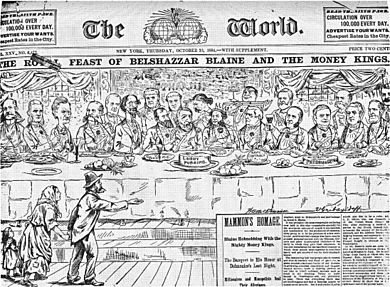Elite facts for kids
The elite are a small group of people who have a lot of power. They might have a lot of money, special advantages, or political influence. These people are often seen as the "best" or most powerful in their field.
An American expert named C. Wright Mills said that members of the elite often know each other well. They tend to understand each other, marry each other, and think alike. Education plays a big role in how they become part of this group.
Contents
How Education Helps the Elite
Young people from wealthy families often go to special private schools. These schools help them get into famous universities like Harvard, Yale, Princeton, and the University of Pennsylvania.
At these universities, they can join exclusive clubs. These club memberships then open doors to important social clubs in big cities. These social clubs are places where they can meet important people and make business connections.
Who Makes Up the Power Elite?
According to C. Wright Mills, men get the education and connections they need to become part of the elite. He said the power elite is made of three main groups:
- Political Leaders: Since World War II, leaders from big companies have become very important in politics. They often make big decisions instead of just professional politicians.
- Military Leaders: During Mills' time, there was a lot of worry about wars. This made top military leaders very powerful. Decisions about defense money and finding soldiers became very important. Many company leaders and politicians strongly supported spending a lot on the military.
- Company Leaders: In the 1950s, when the military was a big focus, company leaders worked closely with military officers. Together, they made important plans and policies. These two groups often supported each other.
Mills believed that the powerful elite in the United States mostly includes the president, a few key government officials, important advisors, major company owners, and high-ranking military officers. These groups often work together. Members of the elite can also move from one powerful job to another, which helps them gain even more power.
The power elite is different from a "ruling class." A ruling class is usually based on family history and social connections. The power elite, however, is more about the big organizations they control and how they get their wealth.
What is the Power Elite?
The term power elite was used by Mills to describe a small group of people. This group is loosely connected but has a lot of say in how America is run. It includes leaders from government, big companies, universities, the military, and the media. Their ideas and actions influence decisions made by lawmakers.
To be part of the power elite, you usually need an important job. This could be in a well-known private company or a public organization. Studies have shown that people from upper-middle-class families often become part of this elite group.
A study in 2002 looked at the power elite during President George W. Bush's time. It found 7,314 powerful jobs held by 5,778 people. Later studies showed some common traits of this group:
- Age: Company leaders were often around 60 years old. Heads of charities, law firms, and schools were about 62. Government workers were around 56.
- Gender: About 80% of political leaders were men. Only about 20% were women. In big companies, only a small number of top leaders were women.
- Ethnicity: In the US, most of the power elite are White Anglo-Saxons. While many top business leaders are Protestant, about half of the members of Congress are also Protestant. Only a very small number of top company leaders were African American, Latino, or Asian.
- Education: Almost all leaders had a college education. Nearly half had advanced degrees. Many of them graduated from just 12 very famous universities.
- Social Clubs: Most people in top elite positions belong to one or more exclusive social clubs. About a third belong to very fancy clubs in big cities like London, New York City, and Washington, D.C..
How the Elite Affect the Economy
In the 1970s, some policies were put in place to lower taxes, especially for rich people. They also slowly reduced help for people who needed it. Starting in the 1980s, wealthy bankers successfully pushed for fewer rules on their businesses.
The power elite has a lot of money and connections. This gives them a lot of influence over economic and political decisions. They can often get the results they want. Some experts believe that these elite individuals should think beyond their own interests. They should focus on helping everyone, not just their own group. This could help solve problems that affect many less wealthy people.
Global Power
Mills also found an "inner core" of the power elite. These are people who can move between different powerful jobs. They know a lot about many important organizations. Mills called them "professional go-betweens" for business, politics, and military matters.
As businesses grow worldwide, and economic and military power spreads, leaders of the power elite become connected to countries all over the world. This creates big differences between rich and poor on a global scale.
One expert, Manuel Castells, says that today's global economy doesn't mean everything is global. Instead, some valuable parts of the world and some people become connected to global networks that create wealth. But, everything and everyone not valued by these networks gets left out. These changes have led some scientists to wonder if a new, powerful global elite is forming at the very top of society.
See also
 In Spanish: Élite para niños
In Spanish: Élite para niños
- Alpha (ethology)
- Boston Brahmin
- Bourgeoisie
- Cabal
- Conflict theories
- Elite theory
- Elitism
- The Establishment
- International Debutante Ball
- Invisible Class Empire
- Jet set
- Liberal elite
- Political class
- The powers that be (phrase)
- Plutocracy


